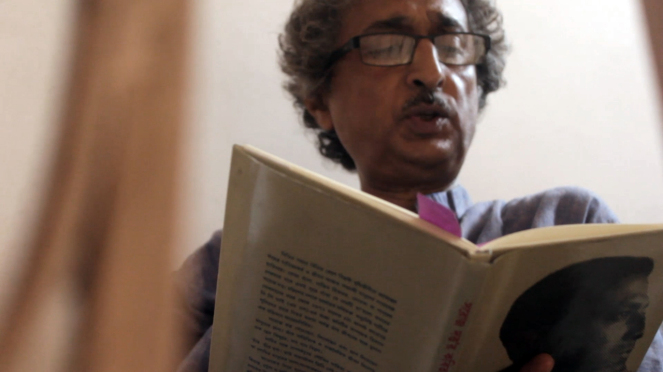
Name of the film S.D.
Directed by Kasturi Basu, Mitali Biswas
Year 2018
CountryIndia
Duration110 mins
LanguageBengali
About the film
In 1971, Saroj Dutta, communist revolutionary and poet, disappeared from the city of Kolkata. His was a copybook case of forced disappearance amidst widespread State repression on communist rebels. A secret killing that since became part of the urban folklore, a crime the State denies till date. Saroj Dutta, or S.D. as he was popularly known as, wore many identities. Poet, translator, journalist, revolutionary, iconoclast. Looking at his life and times five decades later, how do we make sense of the historical figure that S.D. was? The film is a search for many such answers. Using Saroj Dutta’s writings and poems, memories that inhabit spaces and sites in the present-day city, a flood of rich archival material and conversations with several active participants of the heady days of the first phase of the Naxalbari movement (1967-1972), this documentary explores how Saroj Dutta’s story – in its eventful turns and brutal execution – talks to our present. Teaser of the film from 2017: https://www.youtube.com/watch?v=Ihx22qivALM
Director’s Note
The 1960s and 1970s marked a watershed period in the history of India, even as anti-State rebellion reverberated across the world. The Naxalbari peasant uprising in post-1947 India marked a point of departure in the Communist Movement in the country, bringing the question of agrarian revolution to the forefront. The large-scale killing and forced disappearances of thousands of mostly young revolutionaries marked forever the Indian State’s bloody legacy of crushing all attempts at a radical transformation of society. Saroj Dutta was a historical figure shaped by his times. Like Victor Jara and Federico Garcia Lorca, he too was killed for wielding his pen against the State’s bullets. This period also marked the hollowing out of lofty notions of ‘justice’, ‘democracy’, ‘civil rights’ and ‘rule of law’, empty promises of a failed democracy. It has always intrigued and disturbed us that no moving images of the Naxalbari movement exist, though written documents and literary works are a-plenty. As far as cinematic representation is concerned, the balance has been heavily tilted in romanticized depictions of valour and sacrifice of the urban middle-class student and youth challengers of the State, while at the same time almost erasing out the peasant question from memory. This film began on the birth centenary year of Saroj Dutta and wrapped up, after four years, on the 50th year of the Naxalbari movement. In attempting to tell the story of Saroj Dutta, the story itself rolled out and painted its canvas to reflect the context, complexities, turbulences, audacious hopes and aborted promises of the times. Saroj Dutta’s life couldn’t be seen in isolation from the burning questions of his space-time, which still continue to speak to us.
Director Biography
Kasturi Basu is a social activist, science researcher, occasional writer and editor based in Kolkata. She is a founder-member and film movement activist with the People’s Film Collective, and co-editor of Pratirodher Cinema, a magazine on cinema and counterculture. She has co-edited a volume Toward’s a People’s Cinema: Independent Documentary and its Audience in India [January, 2018] published by Three Essays Collective. S.D.[2018] is her first attempt at co-directing a feature-length documentary. Mitali Biswas is a social activist and worked as a freelance journalist (1998-99) for the show Aajkaler Aina, a TV news magazine from the Aajkal House. She also worked as a freelance camera reporter for a brief period for Doordarshan news magazine Chitra. In the year 2015, she directed and produced a documentary film titled Naam Poribortito — Identity Undisclosed on the theme of sexual violence against women. She also co-directed SD, a documentary film based on slain communist revolutionary Saroj Dutta. At present, she is in the editorial board of Protibidhan, a magazine dedicated to women’s movements.


